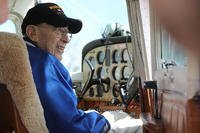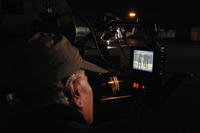A problem with Pratt & Whitney's F135 engine caused the F-35 fire on June 23 that triggered a fleet-wide grounding of the fighter jet, according to a report by USNI News.
An engine malfunction was assumed to be the culprit, given how the blaze started in the rear of the plane. But the article is the first to peg the propulsion system's after-burning turbofan -- not necessarily the integrated power pack -- to the incident.
The fire occurred in an F-35A Lightning II as the pilot was attempting to take off from Eglin Air Force Base in Florida. The F-35A is the Air Force's version of the jet designed to take off and land on conventional runways. While the pilot was able to power down and safely escape the fifth-generation stealth fighter, the Lockheed Martin Corp.-made aircraft was significantly damaged.
Indeed, the incident appears to be far more serious than originally thought and may cause Defense Department officials to cancel the jet's international debut in coming days in the United Kingdom.
Three F-35Bs, the Marine Corps' version of the plane designed to fly like a plane and land like a helicopter, were to be displayed at the Royal International Air Tattoo at Royal Air Force Fairford, which runs July 9-14.
More importantly, the aircraft were scheduled to fly at the Farnborough International Airshow outside London, which runs July 14-20. The show was not only to be the F-35's first international flight, but also a high-profile opportunity for U.S. leaders to drum up support for the aircraft among NATO allies.
Army Col. Steve Warren, a spokesman at the Pentagon, on Monday said officials haven't yet decided whether they will send the planes overseas for the shows.
The Defense Department officially announced the fleet-wide grounding of the aircraft late in the day on July 3 -- hours after many politicians and journalists had left town for the Fourth of July holiday and days after the Air Force and other services decided to halt flights of the aircraft while investigators tried to determine what caused the fire.
The announcement also said a decision as to whether to fly the planes to England would have to be made early this week, but didn't specify a deadline.
After the fire, Pratt & Whitney, part of Hartford, Connecticut-based United Technologies Corp., issued a statement saying the company would cooperate with the Joint Strike Fighter program office to identify the root cause. The company hasn't issued another statement since and a spokesman directed queries to military spokesmen at Eglin.








